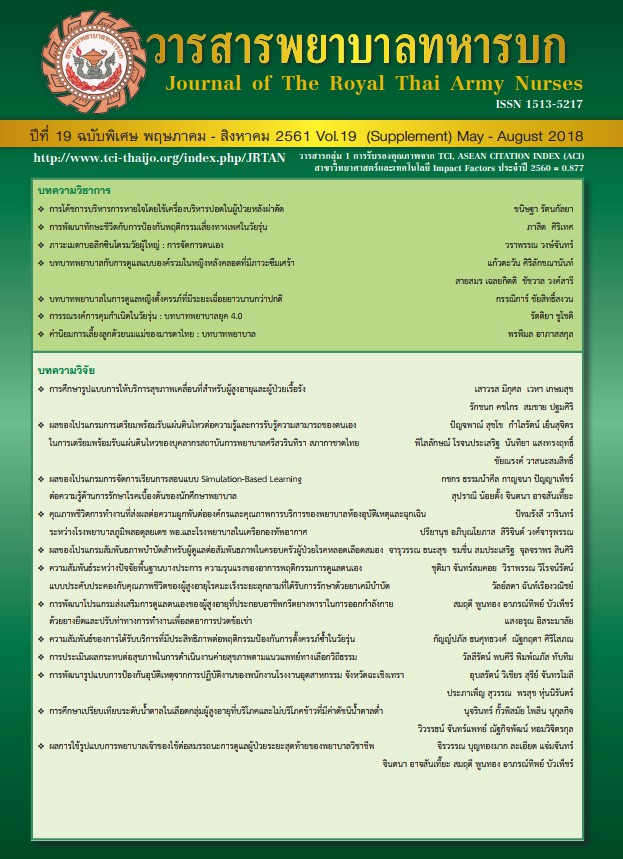Relationships between Basic Conditioning Factors, Symptom Severity, Palliative Self-Care Behaviors and Quality of Life in Older Adults with Advanced Cancer Receiving Chemotherapy
Keywords:
Symptom severity, Quality of life, Older adults, Cancer, Palliative self-care behaviorsAbstract
This study aimed at investigating the relationship between basic conditioning factors, symptom severity, and palliative self-care behaviors and quality of life of older adults with advanced cancer receiving chemotherapy. Shared theory was employed as the conceptual framework of the study. The study sample consisted of 111 older adults aged 60 years old and older who had been diagnosed with advanced cancer, and who received chemotherapy and palliative care. Data were collected by means of questionnaires, and Chi-square test, Eta test, and Spearman correlation coefficient were used to analyze the data. The study findings showed that quality of life were at a moderate level (Mean = 5.09, SD = 1.78) gender and educational background were not related to quality of life, while sufficiency of income was associated with quality of life with statistical significance at .05. Moreover, symptom severity was negatively related to quality of life and palliative self-care behaviors were positively related to quality of life, with statistical significance (r = -.632, r = .763, p < 0.01, respectively). The study findings suggested that nurses should assess sufficiency of income, symptom severity, and self-care behaviors of patients so as to more effectively devise a plan to assist older patients with advanced cancer receiving chemotherapy to ensure their quality of life.
Downloads
References
Petpichetchian W. Best nursing practive in cancer care. Songkla: Chanmuang Printing; 2011. (in Thai)
Connor SR, Sepulveda Bermedo MC. Global atlas of palliative care at the end of life. London: Worldwide Palliative Care Alliance; 2014.
Repetto L. Greater risks of chemotherapy toxicity in elderly patients with cancer. J Support Oncol. 2003; 1(4): 18-24.
Usta YY. Importance of social support in cancer patients. Asian Pac J Cancer Prev. 2012; 13(8): 3569-72.
Barnes M, Taylor D, Ward L. Being well enough in old age. Critical Social Policy. 2013; 33(3): 473-93.
Zimmermann C, Burman D, Swami N, Krzyzanowska MK, Leighl N, Rodin G, et al. Determinants of quality of life in patients with advanced cancer.
Support Care Cancer. 2011; 19(5): 621-9.
Chui YY, Kuan HY, Fu IC, Liu RK, Sham MK, Lau KS. Factors associated with lower quality of life among patients receiving palliative care.
J Adv Nurs. 2009; 65(9): 1860-71.
Dehkordi A, Heydarnejad MS, Fatehi D. Quality of Life in Cancer Patients undergoing Chemotherapy. Oman Med J. 2009; 24(3): 204-7.
Heydarnejad MS, Hassanpour DA, Solati DK. Factors affecting quality of life in cancer patients undergoing chemotherapy. Afr Health Sci. 2011; 11(2): 266-70.
Nilmanat K, Petpichetchian W, Wiroonpanich W, Kritcharoen S. A Survey of Symptom Experience and Symptom Management in Persons Living with Cancer in Thailand. Songkla: Prince of Songkla University; 2008. (in Thai)
Tai SY, Lee CY, Wu CY, Hsieh HY, Huang JJ, Huang CT, Chien CY. Symptom severity of patients with advanced cancer in palliative care unit: longitudinal assessments of symptoms improvement. BMC Palliat Care. 2016; 15(32): 1-7.
Prutipinyo C, Maikeow K, Sirichotiratana N. Self-Care Behaviours of Chemotherapy Patients. J Med Assoc Thai. 2012; 95(6): 30-7. (in Thai)
Lekdamrongkul P, Pongthavornkamol K, Chompoobubpa Th, Siritanaratkul N. Relationships among Information Needs, Information Received, Self-care Behaviors and Quality of Life in Hematologic Cancer Patients Receiving Chemotherapy. J Nurs Sci. 2012; 30(3): 64-73. (in Thai)
Desbiens JF, Gagnon J, Fillion L. Development of a shared theory in palliative care to enhance nursing competence. J Adv Nurs. 2012; 68(9): 2113-24.
Dobrina R, Tenze M, Palese A. An overview of hospice and palliative care nursing models and theories. Int J Palliat Nurs. 2014; 20(2): 75-81.
Medical technology assessment project committee. The Comparison of the Test Performance between the MMSE-Thai 2002 and the TMSE for Dementia Screening in the Elderly. Bangkok: Thai Geriatric Medicine Institute, Ministry of Public Health; 2008.
Chinda M, Jaturapatporn D, Kirshen AJ, Udomsubpayakul U. Reliability and validity of a Thai version of the Edmonton Symptom Assessment Scale (ESAS-Thai). J Pain Symptom Manage. 2011; 42(6): 954-60.
Cohen SR, Sawatzky R, Russell LB, Shahidi J, Heyland DK, Gadermann AM. Measuring the quality of life of people at the end of life: The McGill Quality of Life Questionnaire-Revised. Palliat Med. 2017; 31(2): 120-129..
Yoon H, Kim Y, Lim YO, Lee HJ, Choi K. Factors affecting quality of life of older adults with cancer in Korea. Geriatr Gerontol Int. 2015; 15(8): 983-90.
Delgado GM, Ferer J, Reiber AG, Rhondali W, Tayjasanant S, Ochoa J, Bruera E. Financial Distress and Its Associations With Physical and Emotional Symptoms and Quality of Life Among Advanced Cancer Patients. Oncologist. 2015; 20(9): 1092-8.
Park SA, Chung SH, Lee Y. Factors influencing the quality of life of patients with advanced cancer. Appl Nurs Res. 2017; 33(17): 108-112.
Poonsamer O, Wirojratana V, Jitramontree N, Thosingha O. The Relationships between Knowledge of Chemotherapy Treatment, Skills of Self-Care, Social Support and Well-Being During Transition Among Older Patients with Cancer Receiving Chemotherapy. Journal of The Royal Thai Army Nurses. 2014; 15(2):
368-377. (in Thai)
Downloads
Published
How to Cite
Issue
Section
License
บทความหรือข้อคิดเห็นใดใดที่ปรากฏในวารสารพยาบาลทหารบกเป็นวรรณกรรมของผู้เขียน ซึ่งบรรณาธิการหรือสมาคมพยาบาลทหารบก ไม่จำเป็นต้องเห็นด้วย
บทความที่ได้รับการตีพิมพ์เป็นลิขสิทธิ์ของวารสารพยาบาลทหารบก
The ideas and opinions expressed in the Journal of The Royal Thai Army Nurses are those of the authors and not necessarily those
of the editor or Royal Thai Army Nurses Association.






